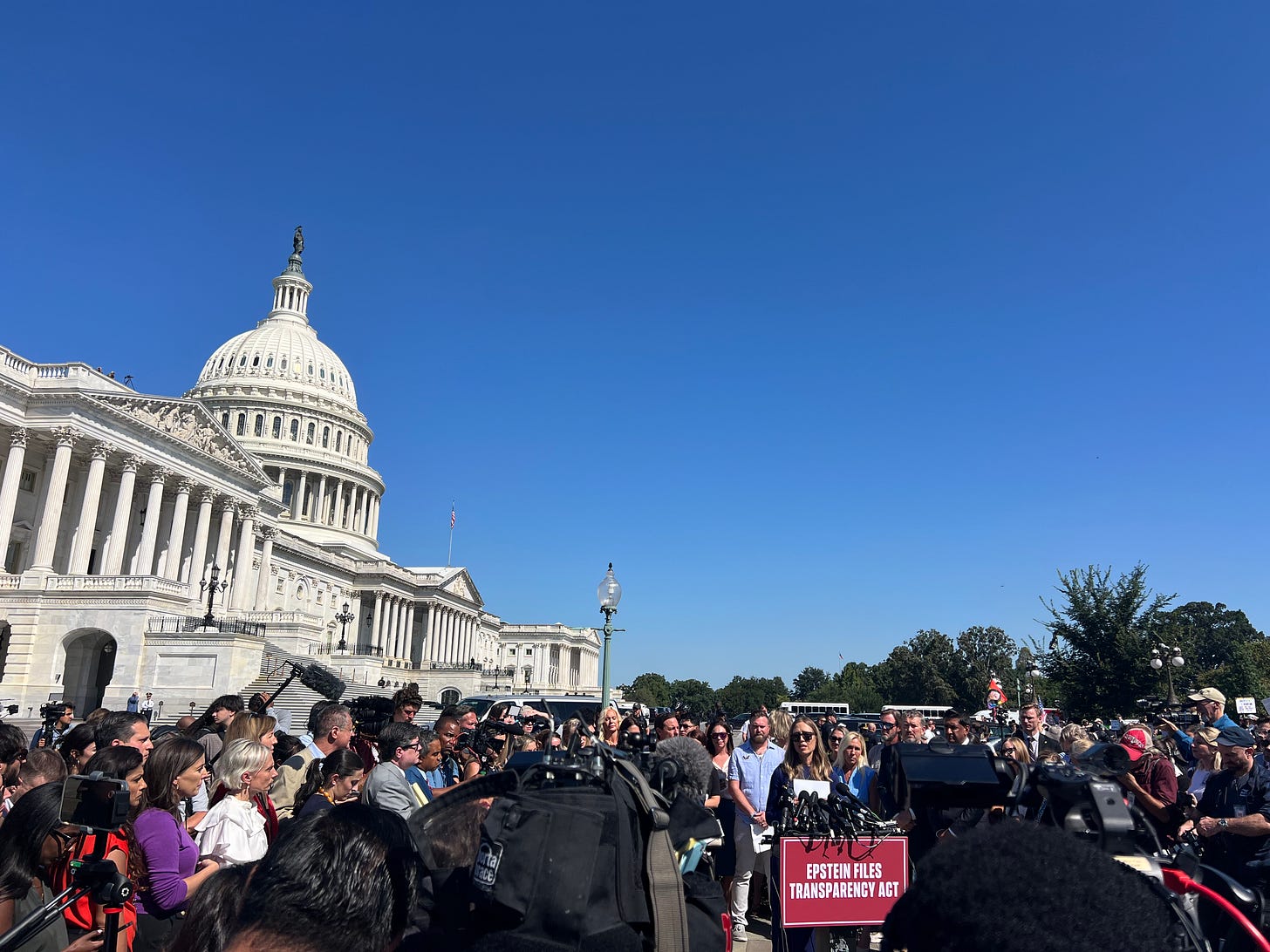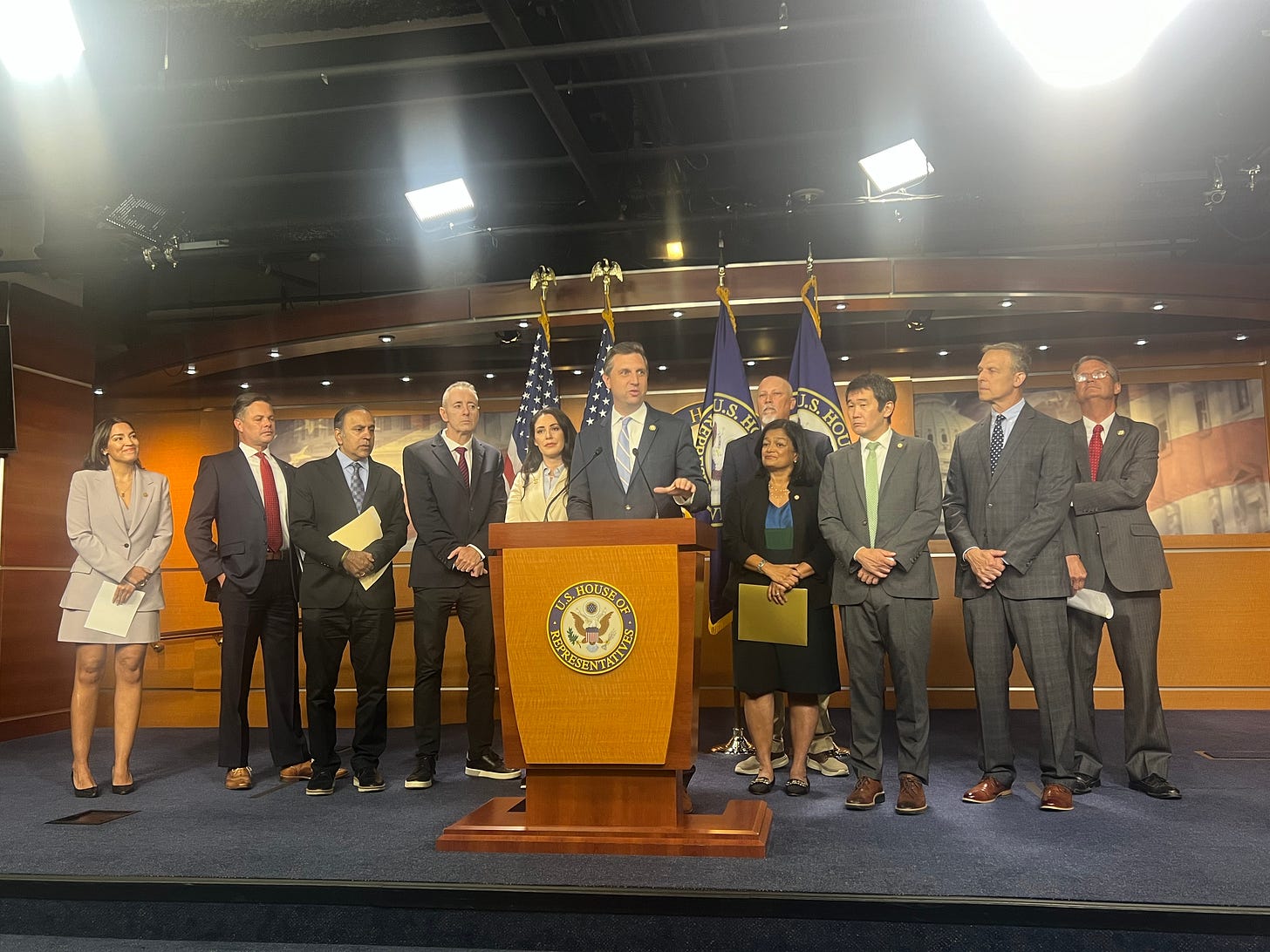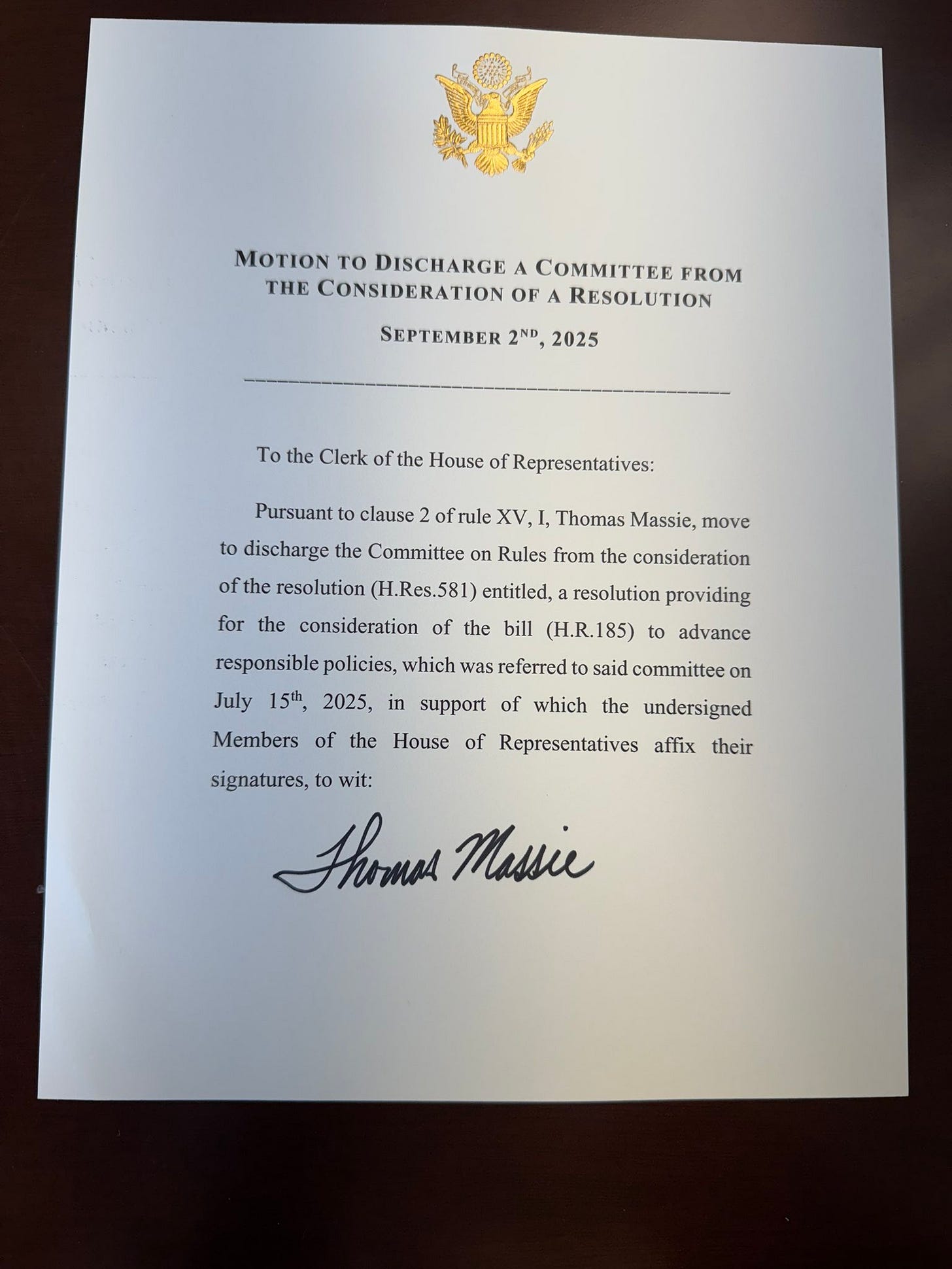A Day of Strange Bedfellows
Two populist uprisings facing the U.S. House.
Anyone who doesn’t believe in Horseshoe Theory should have been with me yesterday, because — over the course of a few hours — I saw Ro Khanna hug Marjorie Taylor Greene, and Tim Burchett give a fist bump to AOC.
Just when you thought you’ve seen everything.
The first unexpected interaction came in the middle of a media circus: a press conference about Jeffrey Epstein.
Reps. Khanna and Greene, a Bernie Sanders-style California Democrat and a right-wing Georgia Republican, were there, along with Rep. Thomas Massie (R-KY), who has been leading the effort pressuring the Trump administration to release the Epstein files, continuing his role as a rare GOP thorn in the president’s side.
The congressional trio was joined by several of Epstein’s victims, as well as an overflowing crowd of reporters and attendees. Several journalists said it was the largest audience for a Capitol Hill press conference they had ever seen; police officers repeatedly had to push a raucous group of protesters — wielding signs like “Follow the Money” and “Release the Files” — away from the event.
Many of the victims teared up as they told their stories, and I saw some reporters growing emotional as well. These women were nearly all teenagers when they first met Epstein, who then subjected them to terrible abuse. Marina Lacerda was a 14-year-old immigrant working three jobs to support her mother and sister when a friend told her she could make $300 by giving an older man a massage. “It went from a dream job to the worst nightmare,” she said. Lacerda ended up dropping out of high school to work full time for Epstein.
Haley Robson was 16 when Epstein groped her and “asked me to do things to him” as she gave him a massage. He gave her $200, and promised the same amount for every one of her high school classmates she would bring to him.
“I have never been more scared in my life than I was that first time that he hurt me,” Jena-Lisa Jones said. It was hard to listen to.

As I stood there, though, I couldn’t help but feel that the women were being used: by Democrats, who view the issue as a way to attack Donald Trump; by Republicans, who see the issue as a way to advance various conspiracy theories; by the media, whose questions to the women focused mainly on the president.
Massie and Khanna have introduced the Epstein Files Transparency Act, which would require the Justice Department to “make publicly available in a searchable and downloadable format all unclassified records, documents, communications, and investigative materials” on Epstein in its possession.
(Personally identifiable information of victims would be redacted, but the bill says that “no record shall be withheld, delayed, or redacted on the basis of embarrassment, reputational harm, or political sensitivity, including to any government official, public figure, or foreign dignitary.”)
They have also initiated a discharge petition, which would force a vote on the bill if a majority of House members (218) sign on. As of this writing, they are at 214 signatures: 210 out of the chamber’s 212 Democrats, plus Reps. Massie, Greene, Lauren Boebert (R-CO), and Nancy Mace (R-SC).
But most of the Democrats who have rushed to sign the petition had barely ever spoken about Epstein — or the plight of the women they now champion — before they spied a political advantage. Khanna has posted on X about Epstein more than 50 times in the last two months across his personal and official accounts; before July, he had posted about Epstein only once, in 2019. There is no indication that Khanna made any effort to release these files during the four years that his own party controlled the Justice Department.
Massie and Greene have longer histories of talking about Epstein, although generally more to serve their political ends than to support the victims. (Massie has suggested that Epstein was “involved in higher level espionage with business leaders and the executive branch.” Greene has repeatedly brought up ties between Epstein and the Clintons.)
“Why did nobody but our lawyers care before now?” Courtney Wild, one of Epstein’s victims, asked during the press conference. “It seems people only started to care because of Twitter and politics.”
Later in the day, I dropped by another bipartisan press conference on the Hill. This one was much less crowded: held indoors, not every seat in the room was filled. Gone were the protesters from earlier in the day, chanting about Trump (sometimes, tellingly, drowning out the voices of the victims speaking); absent too were the big-name TV correspondents who had peppered the women and their lawyers with questions.
This occasion was the introduction of the Restore Trust in Congress Act, the latest of many cross-party efforts to ban lawmakers from trading stocks.
The measure is a combination of four separate legislative efforts; the authors of the previous bills, including Reps. Chip Roy (R-TX), Seth Magaziner (D-RI), Tim Burchett (R-TN), Pramila Jayapal (D-WA), and Alexandria Ocasio-Cortez (D-NY), all stood united at Wednesday’s press conference behind the new bill.
“It’s very rare, I feel, in Washington that when we bring multiple stakeholders and folks together to negotiate on a bill, that you leave that room feeling like the bill got better,” Ocasio-Cortez said. “A lot of times it feels like you’ll get to an agreement, and we’re holding our nose to get something past the post, but I genuinely feel in this process, that in putting all of our bills together, we actually ended up with a product that is legitimately stronger than the sum of its parts.”
The combined package would prohibit members of Congress from owning, buying, or selling individual stocks, securities, commodities, or futures. Lawmakers would still be able to invest in mutual funds, as long as they aren’t concentrated in a single industry. The bill would take effect 180 days after its enactment; going forward, new members of Congress would have 90 days to divest. After that, any lawmaker who violates the measure would be required to give back any profits they made from the transaction, plus pay a fee equal to 10% of the investment.
Spouses and dependent children would also be covered under the bill; executive branch officials wouldn’t. President Trump had previously lashed out at Sen. Josh Hawley (R-MO) for introducing a bipartisan bill, approved by a Senate committee in July, that would ban presidents and vice presidents, as well as lawmakers, from trading stocks. (Hawley later chalked up the spat to a misunderstanding, and said that Trump now supports the bill.)
“There are 330 million Americans. There are 435 of us. If you want to day trade, leave Congress,” Roy said at the press conference, citing data by Capitol Trades that 113 members of Congress made more than 9,200 stock trades in 2024 involving 76 million shares. Several of the lawmakers noted that members of Congress have access to information (whether the government will shut down; whether a bill regulating an industry will pass) that could inform their trades. Conversely, others warned about lawmakers voting for or against legislation based on how it would impact their portfolios.
“It is the simplest thing that the American people want, which is to know that their member of Congress represents them and not their own pocketbooks,” Jayapal said.

Several speakers at the press conference vaguely alluded to plans to force the bill onto the floor if House Speaker Mike Johnson (R-LA) doesn’t sign on, without delving into specifics. “We will find a way to get to this to the floor one way or another, and we’ll leave it at that,” Rep. Brian Fitzpatrick (R-PA) said. “There are multiple pathways. We are not going to let another Congress pass without getting this done.”
Only Rep. Anna Paulina Luna (R-FL), never one to remain shy, made things explicit. “I sometimes feel like an adjudicator in this job, so I guess I’ll be the one to say that we’ve asked nicely for leadership to put this on the floor,” Luna said. “If they don’t, I’m saying timeline is end of month. There’s a discharge petition prepared and ready to go.”
During the Q&A, I asked Roy and Magaziner — the bill’s lead authors — if they also planned to support a discharge petition if the measure hasn’t received a vote by the end of September.
“We expect it to move through regular order,” Roy told me, “and if it doesn’t move through regular order, then we’ll decide what we need to do to make sure that it gets a vote. But it will get a vote.” Magaziner said that he was “agnostic” about how the measure reaches the floor, but expressed openness to a discharge petition as well.
Luna, who has already had one discharge petition (on allowing House members who give birth to vote remotely) reach 218 signatures this Congress, grinned as the two men danced around the question. Later, when Roy spoke about the need for the stock-trading measure to receive a vote, she could be heard whispering from behind them: “Discharge petition.”
Put together, the two events I attended Wednesday pose twin threats to the main source of Johnson’s power in Washington: his control of the House floor. Usually, nothing receives a vote in the House without his sign-off; discharge petitions are the best way for rank-and-file members, usually on a bipartisan basis, to disrupt that process and push bills onto the agenda, as long as they boast broad support.
For the moment, Johnson is still in the driver’s seat: Massie and Khanna need two more Republicans to sign their discharge petition, and it’s not clear they will get them, nor did it seem like the stock-trading group was united behind Luna’s plan. But both events were their organizers’ way of subtly threatening the speaker. (Meanwhile, Johnson’s control also suffered a blow Wednesday, when five Republicans broke ranks to defeat a resolution censuring a Democratic congresswoman.)
At each press conference, speaker after speaker noted the surprising nature of the alignments. “I’ve never done a press conference with Marjorie Taylor Greene before,” Khanna joked. (“Gimme a hug,” Greene said afterwards, and the two embraced.) “It is one of those rare moments where I feel like Washington is working the way that it is supposed to work, and it feels foreign, and it feels alien,” Ocasio-Cortez said about the stock-trading bill. (The right-wing Burchett, who affectionately calls his progressive colleague “Cortez,” extended his hand for a fist bump.)
Both bipartisan coalitions sounded populist notes on Wednesday, a reminder of the glue that often connects these left- and right-wing members on opposite sides of the political spectrum.
“For years, members of Congress, we know they’ve gotten rich using hardworking Americans’ taxpayer money,” Burchett said.
“There’s become two Americas,” Greene said. “There’s the America for the rich and the powerful and the elite where they never face any struggles or problems and never experience what real America goes through. And then there’s forgotten America that faces all the problems and deals with all the issues, and never gets justice for being sexually assaulted and raped by a monster.”
Both groups are now signaling plans to use the ultimate populist tool (at least on Capitol Hill) — the discharge petition, an uprising from the rank-and-file against leadership — to turn their unusual bipartisan agreements into law.




I completely disagree with your observation that you “couldn’t help but feel that the women (who spoke to the media in front of the Capitol) were being used.” A more compassionate and less judgmental observation would be that this was the first time those women, en masse, had a forum in which to be heard. Your view cheapens their courage. It’s disappointing, Gabe.
Off topic: Steve Vladeck wrote a dynamite post this morning gaging how the courts have reined in the Trump administration to a significant, but limited degree. He allowed me to restock the post on my sub stack where you can read it for free:
Bonus 176: Law, Lawlessness, and Doomerism
Guest post by Professor Steve Vladeck
https://kathleenweber.substack.com/p/bonus-176-law-lawlessness-and-doomerism